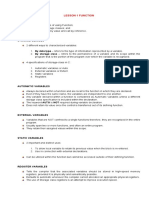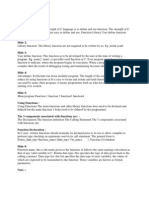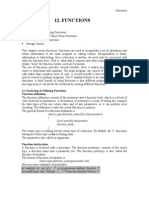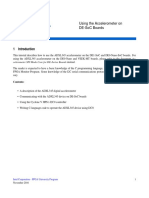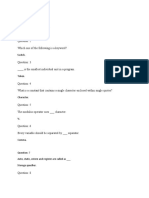0% found this document useful (0 votes)
50 views35 pagesCse 230 Intermediate Programming Incandc++: Functions
This document provides an overview of functions in C programming. It discusses key concepts such as function definition, declaration, scope rules, storage classes, and recursion. The document is a lecture on functions presented by Shebuti Rayana from Stony Brook University for the CSE 230 Intermediate Programming in C and C++ course. It aims to explain the concept and usage of functions to help students effectively decompose problems into smaller pieces using functions.
Uploaded by
cristian flore arreolaCopyright
© © All Rights Reserved
We take content rights seriously. If you suspect this is your content, claim it here.
Available Formats
Download as PDF, TXT or read online on Scribd
0% found this document useful (0 votes)
50 views35 pagesCse 230 Intermediate Programming Incandc++: Functions
This document provides an overview of functions in C programming. It discusses key concepts such as function definition, declaration, scope rules, storage classes, and recursion. The document is a lecture on functions presented by Shebuti Rayana from Stony Brook University for the CSE 230 Intermediate Programming in C and C++ course. It aims to explain the concept and usage of functions to help students effectively decompose problems into smaller pieces using functions.
Uploaded by
cristian flore arreolaCopyright
© © All Rights Reserved
We take content rights seriously. If you suspect this is your content, claim it here.
Available Formats
Download as PDF, TXT or read online on Scribd
/ 35



